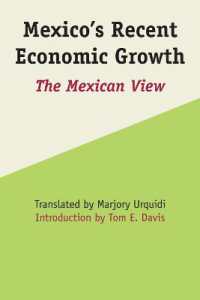Full Description
A critical examination of the environmental movement and the Latinx voices that are shifting how to think about a future shaped by climate change.
In Decolonial Environmentalisms, David VÁzquez argues that the mainstream environmental movement is implicated in racial capitalism, not least through its ignorance of environmental justice as it pertains to Latinx people. Through close readings of eco-minded novels, films, visual art, and short stories by Chicanx, Puerto Rican, Dominican, Cuban American, Peruvian, and Central American culture makers, VÁzquez surfaces diverse Latinx visions for an equitable and sustainable humanity.
In the creations of Helena MarÍa Viramontes, Ester HernÁndez, Salvador Plascencia, the printmaking collective Dominican York Proyecto GRAFICA, and others, VÁzquez locates a bracing critique of racist elisions and assumptions in hegemonic environmentalist thought. At the same time, he shows that the roles of Latinx people in the exploitation of the US West and the ruin of Indigenous communities are ripe for self-examination, in hopes of sparking reform. Indeed, Decolonial Environmentalisms is a work of guarded optimism, finding glimmers of possibility even in dystopic science fiction. The overlooked experiences of Latinx people, VÁzquez suggests, can inspire environmental movements capable of transformative advocacy.
Contents
Introduction. Mapping Decolonial Environmental Imaginaries in Latinx Culture
1. Ecocosmopolitanism, Toxicity, and Solidarity: How Latinx Farmworker Texts Imagine Race, Space, and Authority
2. Memory, Space, and Denizenship: Commemorating 1960s Activism, Nostalgia, and Urban Environmental Preservation
3. Echoes of Manifest Destiny: Race, Space, and Violence in the Latinx Anti-Western
4. The Ironies of Dystopian Environmental Futures: Science Fiction, Hope, and Decolonial Optimism in Sabrina Vourvoulias's Ink and Alex Rivera's Sleep Dealer
Coda. A Concluding Meditation on Decolonial Hope
Acknowledgments
Notes
Works Cited
Index







